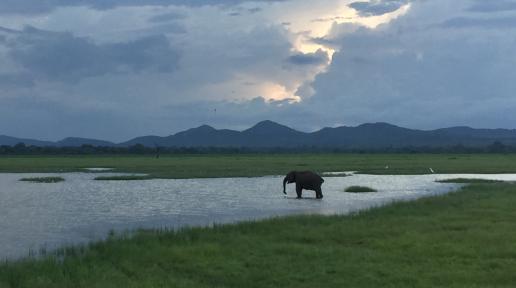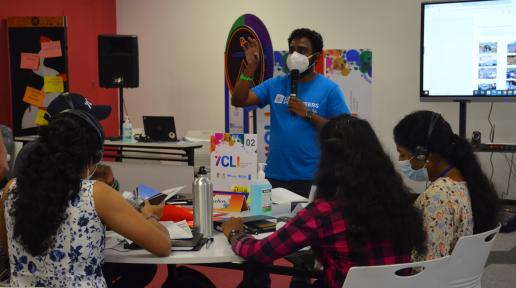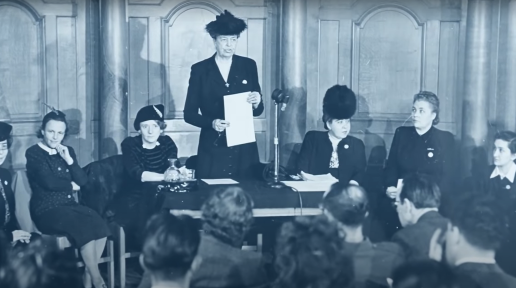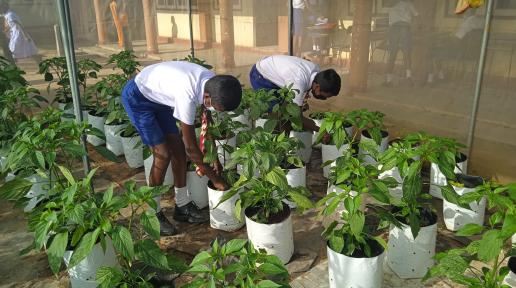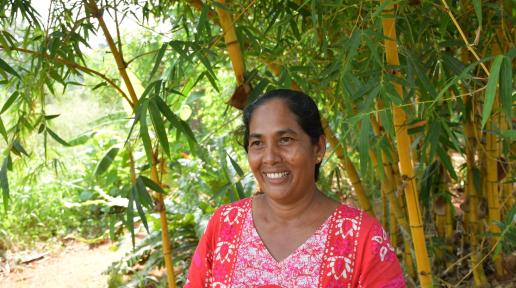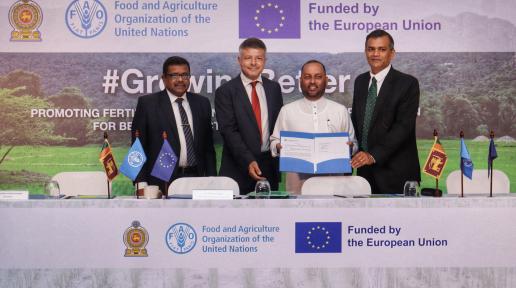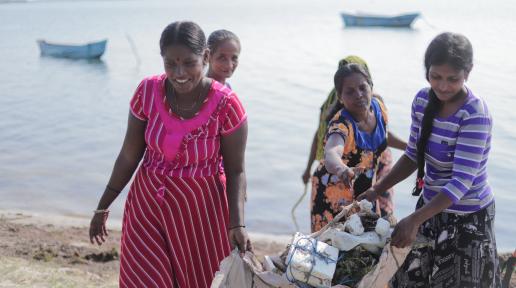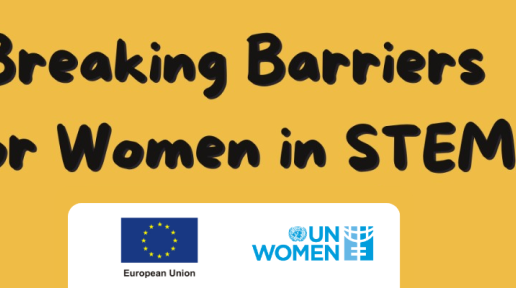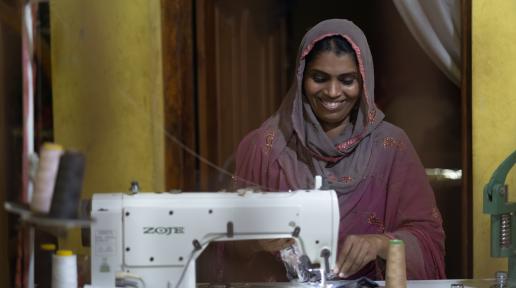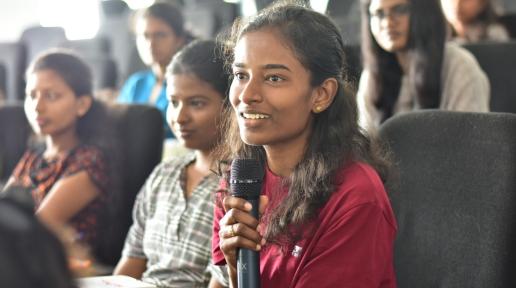Story
10 November 2025
From Student to Advocate
As a final-year law student at the University of Colombo, Asindu Munasinghe never imagined a single programme could change his views on the legal profession. Despite his strong grasp of legal theory, the practical side of the profession felt remote until he signed up for his first legal aid camp.Asindu’s passion for justice grew from a young age after witnessing his father’s numerous land disputes. “I saw firsthand the struggles ordinary people faced within the legal system. When I heard about the legal aid camps, I realised this was my chance to do something meaningful,” Asindu recalls. In an effort to promote legal awareness and access to justice, the University of Colombo Law Faculty, in collaboration with partners, organised multiple legal aid camps across the country. The initiative was part of the Support to Justice Sector Project (JURE), a multi-year programme initiated in 2022, which aims to build a more efficient, inclusive and accountable justice sector. Funded by the European Union and jointly implemented by UNDP and UNICEF Sri Lanka, in collaboration with the Ministry of Justice, JURE brings together stakeholders across state institutions, independent commissions, academic institutions and civil society to drive a national effort in justice sector reform. The legal aid initiative seamlessly integrates two key objectives of the JURE programme: improving access to justice for marginalised communities while providing law undergraduates with hands-on legal experience.In recognition of the increased strain on Sri Lanka's legal aid system due to the COVID-19 pandemic and the ongoing economic crisis, the initiative offers an innovative approach that expands and inculcates pro bono service provision while fostering partnerships between civil society, law students, and the private sector to ensure access to justice for vulnerable communities. Going beyond the classroomThe legal aid camps were organised under the University’s Legal Aid Unit in partnership with JURE and the Legal Aid Commission. They aimed to provide disadvantaged groups with access to justice while equipping law students with much-needed practical exposure. Between 2023 and 2024, 14 legal aid camps were held across 8 districts. These camps provided essential legal support to more than 4,600 individuals struggling with longstanding justice barriers, including land disputes, domestic violence, and labour rights violations. With 925 law students and about 35 pro bono lawyers guiding vulnerable communities through a complex legal system, these camps became a lifeline. Specialised clinics were held for vulnerable groups, including persons with disabilities, the LGBTIQA+ community, fishing communities, and Free Trade Zone workers, among other targeted outreach initiatives. These clinics ensured those with unique legal challenges had access to the support they needed. For law undergraduates like Asindu, this was a rare opportunity to put their skills into practice, gaining invaluable experience in client interaction while deepening their understanding of client sensitivity, ethics, and the role of community engagement in the legal profession.Asindu quickly became deeply involved and took a leading role in organising the legal camps with his peers. This entailed identifying geographic areas in need, securing the support of the Bar Association lawyers, collaborating with the Legal Aid Commission for case handling, and engaging government stakeholders to ensure continued assistance and support. Before each camp, the university students would undergo triage training, learning how to assess cases, maintain confidentiality, and interact sensitively with vulnerable clients. “The first thing I learned was that legal knowledge alone is not enough. Many people who come to us have already been let down by the system. They are frustrated, tired, and often desperate. Our job is not just to advise them but to support them with empathy,” Asindu explained.At legal aid camps, a triage system directs civil cases to lawyers, while law students assist with consultations, case debriefs, and legal documentation, with complicated cases escalated for further legal action and guidance.One of the most impactful moments for Asindu came during a camp held in the Katunayake Free Trade Zone, where a woman, clearly in distress, was reluctant to approach the lawyers with her complaint. As Asindu and his peers quietly reassured her and made her feel more at ease, she finally revealed that she had been sexually harassed by a senior officer at her workplace and coerced into signing a legal agreement. With the help of the criminal lawyer she met at the camp, the officer was subsequently demoted and transferred, and she was reassigned to a safer environment.“Through this experience, I’ve realised that being a lawyer is much more than winning cases - we have to stand with those who have no voice and help them feel heard,” Asindu reflects. Restoring faith in the justice sector
The legal aid camps had an immediate impact on the thousands who attended. Through the collaboration of legal professionals and community members, the camps helped create a network of support while empowering beneficiaries with legal knowledge to protect themselves and seek redress. Many, like a programme beneficiary from Kandy, made determined efforts to seek legal assistance. “I skipped lunch to participate in this clinic after hearing about it at my local temple. I am very upset over a property issue, and I can’t afford to pay for legal advice while also caring for my sick family member. Programmes like these are very valuable,” a participant shared.The initiative has significantly increased awareness of legal rights, enhanced access to legal services and promoted improved trust in the justice sector, especially for those who had given up hope. The camps were a critical resource in empowering communities to protect themselves, challenge misinformation, comprehend legal processes, and gain access to mediation. Recognising that many beneficiaries were daily wage earners unable to afford legal assistance, this intervention directly addressed pressing legal aid needs, ensuring that vulnerable individuals can make informed decisions about their cases. Creating a new generation of lawyersThe initiative also had a profound impact on the students themselves. Witnessing the struggles faced by vulnerable communities, Asindu and his peers have committed to working one day of every month pro bono to provide legal aid services to deserving clients. For Asindu, the experience has strengthened his commitment to working in an ethical and empathetic manner. “I am determined that in my career, I will never earn a rupee the wrong way. Where I charge for my services, I will give my clients the best possible support. And where I can serve for free, I will—because justice should never be a privilege,” he says.As Asindu prepares to graduate, he recognises that his legal journey will go beyond building a career. He is determined to continue to be part of this movement to ensure justice for those who need it most.
The legal aid camps had an immediate impact on the thousands who attended. Through the collaboration of legal professionals and community members, the camps helped create a network of support while empowering beneficiaries with legal knowledge to protect themselves and seek redress. Many, like a programme beneficiary from Kandy, made determined efforts to seek legal assistance. “I skipped lunch to participate in this clinic after hearing about it at my local temple. I am very upset over a property issue, and I can’t afford to pay for legal advice while also caring for my sick family member. Programmes like these are very valuable,” a participant shared.The initiative has significantly increased awareness of legal rights, enhanced access to legal services and promoted improved trust in the justice sector, especially for those who had given up hope. The camps were a critical resource in empowering communities to protect themselves, challenge misinformation, comprehend legal processes, and gain access to mediation. Recognising that many beneficiaries were daily wage earners unable to afford legal assistance, this intervention directly addressed pressing legal aid needs, ensuring that vulnerable individuals can make informed decisions about their cases. Creating a new generation of lawyersThe initiative also had a profound impact on the students themselves. Witnessing the struggles faced by vulnerable communities, Asindu and his peers have committed to working one day of every month pro bono to provide legal aid services to deserving clients. For Asindu, the experience has strengthened his commitment to working in an ethical and empathetic manner. “I am determined that in my career, I will never earn a rupee the wrong way. Where I charge for my services, I will give my clients the best possible support. And where I can serve for free, I will—because justice should never be a privilege,” he says.As Asindu prepares to graduate, he recognises that his legal journey will go beyond building a career. He is determined to continue to be part of this movement to ensure justice for those who need it most.


